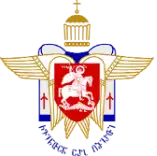+1 647 868 0089

- This event has passed.
Event Series:
დიდი მარხვა – Great Lent
დიდი მარხვა – Great Lent
March 18

- During the week between the Sunday of the Publican and the Pharisee and that of the Prodigal Son, there is a general dispensation from all fasting. Meat and animal product may be eaten even on Wednesday and Friday.
- In the following week…the usual fast is kept on Wednesday and Friday. Otherwise there is no special fasting.
- In the week before Lent, meat is forbidden, but eggs, cheese and other dairy products (as well as fish) may be eaten on all days, including Wednesday and Friday.
- On weekdays (Monday to Friday inclusive) during the seven weeks of Lent, there are restrictions both on the number of meals taken daily and on the types of food permitted; but when a meal is allowed, there is no fixed limitation on the quantity of food to be eaten.
- On weekdays in the first week, fasting is particularly severe. According to strict observance, in the course of the five initial days of Lent, only two meals are eaten, one on Wednesday and the other on Friday, in both cases after the Liturgy of the Presanctified. On the other three days, those who have the strength are encouraged to keep an absolute fast; those for whom this proves impracticable may eat on Tuesday and Thursday (but not, if possible, on Monday), in the evening after Vespers, when they may take bread and water, or perhaps tea or fruit-juice, but not a cooked meal. It should be added at once that in practice today these rules are commonly relaxed. At the meals on Wednesday and Friday xerophagy is prescribed. Literally this means ‘dry eating’. Strictly interpreted, it signifies that we may eat only vegetables cooked with water and salt, and also such things as fruit, nuts, bread and honey. In practice, octopus and shell-fish are also allowed on days of xerophagy; likewise vegetable margarine and corn or other vegetable oil, not made from olives. But the following categories of food are definitely excluded:
- meat;
- animal products (cheese, milk, butter, eggs, lard, drippings);
- fish (i.e., fish with backbones);
- oil (i.e., olive oil) and wine (i.e., all alcoholic drinks).
- On weekdays (Monday to Friday inclusive) in the second, third, fourth, fifth and sixth weeks, one meal a day is permitted, to be taken in the afternoon following Vespers, and at this one meal xerophagy is to be observed.
- Holy Week. On the first three days there is one meal each day, with xerophagy; but some try to keep a complete fast on these days, or else they eat only uncooked food, as on the opening days of the first week. On Holy Thursday one meal is eaten, with wine and oil (i.e., olive oil). On Great Friday those who have the strength follow the practice of the early Church and keep a total fast. Those unable to do this may eat bread, with a little water, tea or fruit-juice, but not until sunset, or at any rate not until after the veneration of the [Plashchanitsa] at Vespers. On Holy Saturday there is in principle no meal, since according to the ancient practice after the end of the Liturgy of St. Basil the faithful remained in church for the reading of the Acts of the Apostles, and for their sustenance were given a little bread and dried fruit, with a cup of wine. If, as usually happens now, they return home for a meal, they may use wine but not oil; for on this one Saturday, alone among Saturdays of the year, olive oil is not permitted.
- On weekdays in the first week, fasting is particularly severe. According to strict observance, in the course of the five initial days of Lent, only two meals are eaten, one on Wednesday and the other on Friday, in both cases after the Liturgy of the Presanctified. On the other three days, those who have the strength are encouraged to keep an absolute fast; those for whom this proves impracticable may eat on Tuesday and Thursday (but not, if possible, on Monday), in the evening after Vespers, when they may take bread and water, or perhaps tea or fruit-juice, but not a cooked meal. It should be added at once that in practice today these rules are commonly relaxed. At the meals on Wednesday and Friday xerophagy is prescribed. Literally this means ‘dry eating’. Strictly interpreted, it signifies that we may eat only vegetables cooked with water and salt, and also such things as fruit, nuts, bread and honey. In practice, octopus and shell-fish are also allowed on days of xerophagy; likewise vegetable margarine and corn or other vegetable oil, not made from olives. But the following categories of food are definitely excluded:
